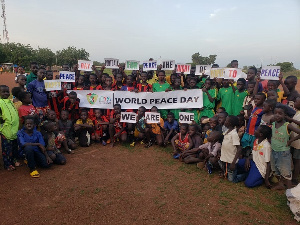 The International Day of Peace is observed every year on 21st September
The International Day of Peace is observed every year on 21st September
On September 21, Rural Soccer Ghana celebrated International Peace Day with a football match, emphasising the importance of peace and education.
The International Day of Peace is observed every year on 21st September, to strengthen the ideas of peace. The day observes 24 hours of non-violence and cease-fire.
In Ghana, 21st September is also observed as Founder’s Day, to mark the birthdate of Ghana’s first President, Osagyefo Dr. Kwame Nkrumah.
Rural Soccer Ghana (RSG) is a youth organisation working with young people in deprived communities, using sport as a communication tool to promote peace.
To mark International Peace Day this year, RSG, in collaboration with the International Peace Youth Group (IPYG), an international organisation of youth for peace, organised a football match in northern Ghana.
The football match was between Bogunaayili and Tolon and the theme of the event was “Football for Peace.” The match was used as a platform to talk about the importance of peace, considering the learnings of sport.
Sport can foster mutual relationships among young people from different backgrounds, and hence can be an important tool in peacebuilding.
The community was also addressed by an RSG volunteer, speaking on behalf of the RSG President, Mr. Abdul-Halim Mustapha, who encouraged the communities to hold and protect the peace they are currently enjoying.
The community was reminded that peace was their right and not a privilege, and was encouraged to reflect on their actions, as violence and conflict disproportionately impact children and women.

Mr. Ziblim Yakubu, a youth leader in the area, also addressed the community, noting that successful players wanting to take their football career to the national and international levels should be disciplined, but should prioritise their education above all. He told parents to emphasise the importance of education to their children as well.
Mr. Muniru Abdul-Latif, a coach, and parent from the community noted that he knows the on-ground reality and has seen what happens to youth who do not complete their education. He re-emphasised the need to encourage children to stay in school, and parents’ roles in providing a supportive environment for their children’s education.
He said that it is important for parents to encourage children and not put pressure on them, allowing them to play sport and games, and attend competitions, but also making sure they are attentive to their academics.